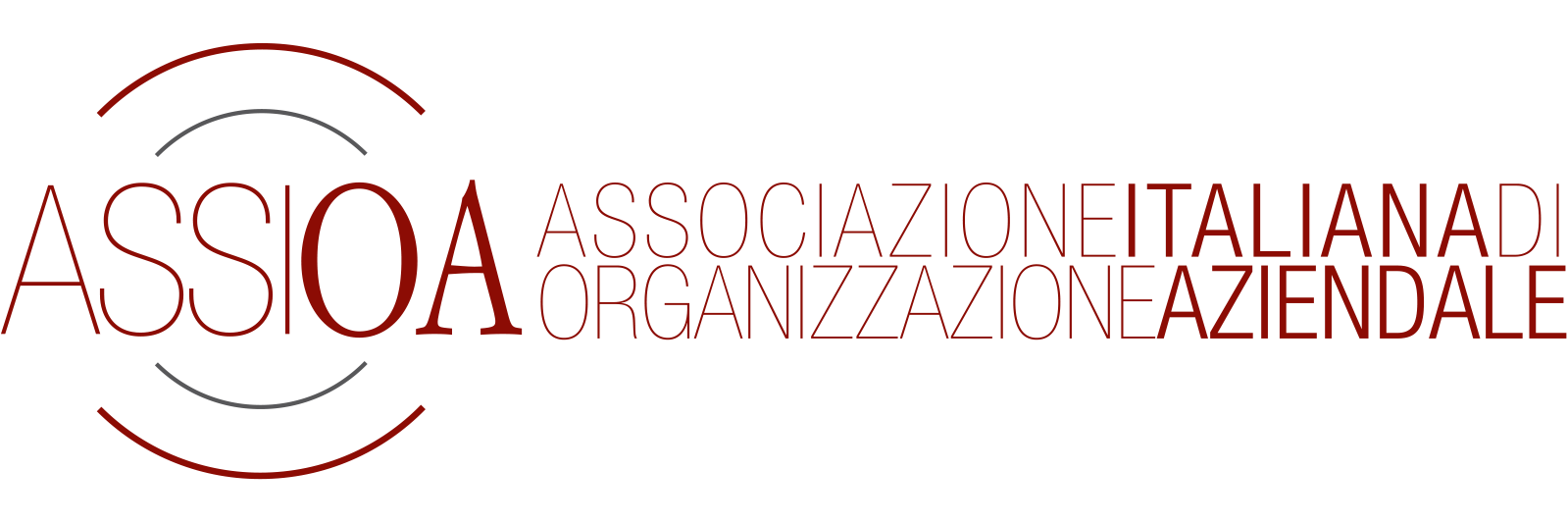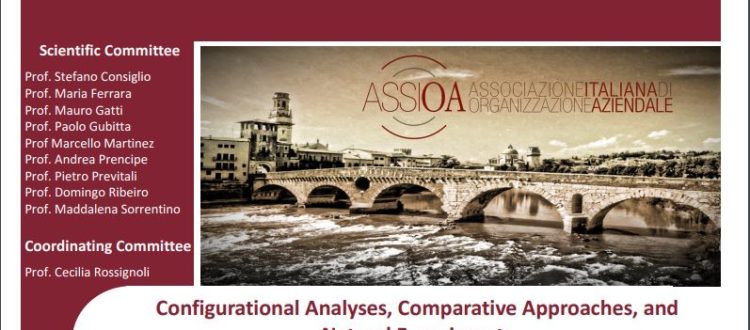ASSIOA Spring School 2018
Spring School 2018 in Business, Management and Organization Research
Verona, Italy
Configurational Analyses, Comparative Approaches and Natural Experiments
First Edition : 9-13 April 2018
Objective
The central goal of this seminar is to enable participants to create and implement sound and effective research designs based on configurational analyses. In particular, the seminar will focus on two approaches that, although different in many respects, can both be based on configurational analyses, and namely: equifinality comparative studies and natural experiments.
The configurational approach provides powerful conceptual tools to model relevant entities (such as organizations, customers, strategies, information systems, etc.) in terms of different possible combinations of relationships among their constituent variables. Configurational frameworks and data sets can result from both qualitative and quantitative data collection, from both deductive and inductive reasoning, from both interpretive and algorithmic analyses. Therefore, developing a “configurational mind-set” provides the researcher with a wide range of possibilities to address complex causal links.
In this seminar, participants will focus especially on how to design and conduct research (1) when different configurations are expected to result in similar outcomes (equifinality comparative studies) and (2) when similar configurations are expected to result in different outcomes after being exposed to different treatments (experimental studies). Therefore, this seminar will allow participants to explore the typical uses of these two research designs in scientific work. This program provides participants with the capability to leverage methodological tools that are highly appreciated in high rating journals. The examples used to illustrate comparative and experimental designs will be drawn from top journals in the Business/Organization/Management area such as the Academy of Management Journal, Organization Studies, Organization Science, Organization Research Methods, Journal of Business Research, Journal of Management Information Systems, Journal of Management, and many others.
Methodological Teaching Approach
The seminar will be strongly oriented to learning-by-doing: more than half classes will be dedicated to group work and practical exercises (also using specific software tools) with continuous support of lecturers and/or tutors. During hands-on classes, participants will be encouraged to reflect on how their own research pipelines may be strengthened by configurational, comparative and experimental approaches. Based on these stimuli, participants will draft and review research projects and protocols; in addition, they will gain practical experience on data analysis techniques that are particularly suited for comparative and/or experimental designs, such as configurational coding, qualitative comparative analysis (QCA), and statistical analyses with categorical independent variables (ANOVA, MANOVA, chi square). Participants will have the opportunity to use their own data (for example, data collected for their PhD thesis) in class exercises.
Venue: Dipartimento di Economia Aziendale dell’Università degli Studi di Verona, Sede Santa Marta, Via Cantarane 24, 37129 – Verona (Italy).
Participants: PhD Students and Post-doc, and Scholars in Business Administration, Management and Organization Studies Field. Maximum 30 participants.
Dates: 8 half-day lectures from Monday afternoon to Friday Morning:
- April 9 2018 (14:00 – 17:30)
- April 10 2018 (9:00 – 17:30)
- April 11 2018 (9:00 – 17:30)
- April 12 2018 (9:00 – 17:30)
- April 13 2018 (9:00 – 12:30)
Application and selection process: The deadline for applications is February 12th, 2018. Please send an email to: springschool@assioa.it, attaching a short bio (maximum 1 page), and a motivation letter (maximum 500 words) including a synthetic description of your ongoing research project(s) and goals. Applicants will receive feedback by March 10th, 2018.
FEES: Standard Fee is 250 euro. For members of Italian Scientific Associations* a discount of 20% is granted”.
*ASSIOA, AIDEA, SIDREA, ADEIMF, AISME, SIM, SIMA
Some scholarships may be available for PhD students.
Language: English
Scientific Committee:
– Prof. Stefano Consiglio ( Università di Napoli Federico II)
– Prof. Maria Ferrara (Università degli Studi di Napoli – Parthenope)
– Prof. Mauro Gatti (Università La Sapienza – Roma)
– Prof. Paolo Gubitta (Università di Padova)
– Prof Marcello Martinez (Università della Campania Luigi Vanvitelli)
– Prof. Andrea Prencipe (Università Luiss Roma)
– Prof. Pietro Previtali (Università degli Studi di Pavia)
– Prof. Domingo Ribeiro (University of Valencia)
– Prof. Maddalena Sorrentino (Università Statale di Milano)
Organizing Committee:
– Prof. Cecilia Rossignoli (Università degli Studi di Verona)
– Dott. Alicia Mas Tur (University of Valencia)
– Dott. Norat Roig-Tierno (Valencia International University and ESIC)
– Dott. Alessandro Zardini (Università degli Studi di Verona)
– Prof. Francesca Ricciardi (Università degli Studi di Torino)
Coordinating Committee:
– Prof. Cecilia Rossignoli (Università degli Studi di Verona)
Faculty:
– Prof. Domingo Ribeiro (University of Valencia)
– Dott. Alicia Mas Tur (University of Valencia)
– Dott. Norat Roig-Tierno (University of Valencia)
– Dott. Alessandro Zardini (Università degli Studi di Verona)
– Prof. Francesca Ricciardi (Università degli Studi di Torino)
– Dott. Yolanda Gomez (DevStat, Valencia)
Lecture Outline
Lecture 1 – Topics: The role of configurational analysis in the wider picture of the most common research designs and methods. Differences and synergies between configurational approaches, indepth case studies and traditional statistical surveys. The role of configurational analysis in the investigation of boundary conditions, joint causality, intervention design and evaluation research. Typology theory, taxonomies, and the explanatory power of configurations (as formative and reflective measurements). Hands-on: based on a given data-gathering setting and broad research question, participants will work in small groups to draft an appropriate and promising research design and the possible role of configurational analysis in it. The results will be discussed in class.
Lecture 2 – Topics: Introduction to configurational coding: top-down and bottom-up techniques. Hands-on: based on a given set of unstructured contents (e.g. interview excerpts) and a broad research question, participants will work in groups to define a set of codes aimed at configurational analysis, based on an organization/management theory of their interest. Then, they will conduct coding individually in order to check the effectiveness of their pre-defined set of codes and to let possible new codes emerge through bottom-up/inductive reasoning. Results will be discussed in class, and techniques of code fine-tuning/adjustment/clustering will be shown.
Lecture 3 – Topics: Introduction to equifinality and joint causality. Necessary and sufficient conditions. Boolean truth tables and Qualitative Comparative Analysis (QCA). Hands-on: participants will build simple truth tables based on diverse sources (coded interviews, secondary data, multimedia). Then, they will work in small groups to write brief reviews of exemplary QCA papers, following the directions of the Lecturer/Tutors. Results (and possible questions raised) will be discussed in class.
Lecture 4 – Topics: Introduction to fuzzy-set QCA (fs/QCA). How to conduct fs/QCA analyses. Complementarities between QCA and within-subject experimental designs. Hands-on: participants will carry out a real practice with the development of scientific research using the fsQCA 3.0 software. The software will be available in class.
Lecture 5 – Topics: Introduction to experimental designs: randomized experiments, quasiexperiments, natural experiments. Within-subject (longitudinal) and between-subjects (crosssectional) designs. The role of subject categorization (through configurational analysis) in order to achieve category-based generalizability of the results. Hands-on: participants will work in small groups to write brief reviews of exemplary papers based on natural experimental designs, following the instructions of the Lecturer/Tutors. Results will be discussed in class.
Lecture 6 – Topics: Introduction to the role of statistical analyses in configuration-based experimental designs. How to conduct and how to use statistical analyses with categorical independent variables (ANOVA, MANOVA, chi square). Hands-on: participants will carry on exercises on statistical analyses, using a software that will be made available in class. Results will be discussed in class.
Lecture 7 – Hands-on: participants will work individually or in small groups and will draft a complete research project and protocol either with a comparative or an experimental design, based on their own interests. Lecturers /tutors will support the work and offer advice. Results will be discussed in class.
Lecture 8 – Hands-on: participants will work in groups to build presentations on what they have learned from the seminar. Results will be discussed in class to let questions and constructive criticism emerge. Further readings will be suggested, along with personalized advice on each participant’s future research work. Participants will be provided in advance with preliminary readings.



